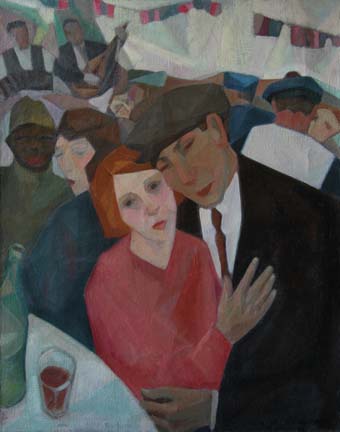Mercedes
Legrand
1893-1945
Mercedes Legrand was born in Almodavar-del-Campo,
Spain. Both of her parents were Belgian.
Legrand spent her first years in Spain; she studied in Brussels, England
and Germany. Legrand attended l’Académie des Beaux-Arts
de Bruxelles from 1916 to 1919.
Legrand married painter and art critic Roger Van Gindertael. She participated
in the creation of the avant-garde magazine Héliante. Beginning
in the early 1920s she made her home in Paris.
Legrand exhibited at the Salon des Tuileries, Salon d’Automne,
and in various group shows at Parisian galleries. She also exhibited
in several galleries in Brussels while still living in Paris. In 1924
she worked as a designer for the French newspaper Le Matin.
Legrand exhibited with many avant-garde artists of her generation, such
as Mané Katz, Pougny, Dufy, Friez, Lhote, Vuillard, and Rouault.
She also had several one-woman shows in Paris, including the Galerie
Zak in 1935. Eugenio d’Ors wrote the catalog essay for this exhibition.
André Salmon also wrote an essay for another exhibition.
In 1937 she remarried to the painter Edmond Kayser. In 1938, Kayser
became the director of l’École des Arts Décoratifs
de Limoges. The couple then moved to Limoge. At this time Legrand began
to work with ceramic and enamel. In 1941 she fled Nazi occupied Limoge
because of her Jewish heritage. She took refuge near Avignon. Legrand
painted many canvases. It is believed that she died from acidic chemical
poisoning resulting from the production of enamel She was 52.
Very few of Legrand’s work are known to exist. She was influenced
by cubism and the starkness of Paris after the First World War. Her
paintings have a superbly modern and mysterious quality that seems to
come from being well traveled at a young age.
Legrand’s work, like many of her contemporaries, has almost fallen
into obscurity, yet recently sophisticated collectors are becoming more
interested in her oeuvre.
Legrand is represented in several museums, including Liège and
Mons.
|

